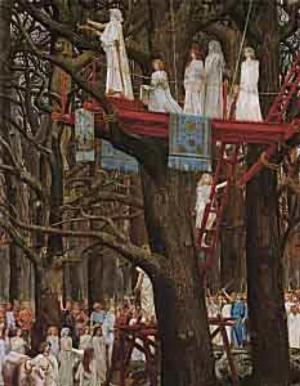| Author: | Benjamin Leopold Farjeon | ISBN: | 9781465607447 |
| Publisher: | Library of Alexandria | Publication: | March 8, 2015 |
| Imprint: | Language: | English |
| Author: | Benjamin Leopold Farjeon |
| ISBN: | 9781465607447 |
| Publisher: | Library of Alexandria |
| Publication: | March 8, 2015 |
| Imprint: | |
| Language: | English |
The shop has its public entrance for customers, and its private entrance for the residents of the house--so private indeed, so circumscribed and squeezed up, that scarcely one out of fifty passers-by would know that it was there; and that one, seeing it by merest chance, might well be lost in wonder at the perplexing idea of a stout man struggling through the narrow passage into which the mockery of a door must necessarily open. Three bell-handles display themselves on each side of the door to snare and entrap the uninitiated; a goggle-eyed knocker (with a face so hideous that babies have gone into convulsions at the sight of it) also adds to the entanglement of ideas. For, knowing that the house contains many inhabitants who have no connection with each other, and some of whom may indeed be at variance, the uninitiated brings confusion upon himself by ringing the wrong bell or knocking the wrong knock. A woman, who lodged somewhere in the vicinity of the coal-cellar, was often the occasion of much distress to the knockers and ringers. This woman, who always made her appearance fresh from the washing-tub, and who came up-stairs invariably wiping her wet arms upon her apron, was afflicted with the perpetual conviction that a ring or a knock, whether single, or double, or treble, was certainly intended for her; and as her temper was none of the sweetest, unpleasant scenes occurred. Many a box on the ears did youthful knockers and ringers receive from the damp hands of the disappointed woman, and many an angry mother would make her appearance in the passage a few minutes afterwards and exchange shrill civilities with the bad-tempered castigator. Sometimes these angry mothers would go almost into hysterics because the woman below declined to comply with such invitations as, "Come up, and I'll show yer!" or, "Come up, and I'll scratch yer eyes out for yer!" or, "What d'yer mean by slappin' my boy Billy about on the 'ead, which was weak from a babby? What d'yer mean by it, yer minx?--What d'yer mean?" (This last fortissimo.) "Come up, and I'll tear the 'air out of yer 'ead!" After which challenges and defiances the angry mothers, with very white faces, would issue into the street, and form the centres of little knots of female neighbours only too willing to discuss the matter and express their opinions. A facetious person, who had called several times at the house, and who was never able to solve the mystery of the bells, once hit upon what he conceived to be a happy idea. He gave a postman's knock; but the rush of eager feet from all parts of the house, and the glare of angry faces that met his smiling one when the door was opened, were sufficient warnings to him never to try it again; and he never did. In the front room of the first floor of this house sits an old man, working in somewhat idle fashion on a few wooden castors or wheels. It is Saturday on a summer evening in June. The window is open; on the sill are two flower-pots. The room, which is a humble one, is very clean and tidy, and there are evidences of comfort, even of refinement about it, humble as it is. Some cheap graceful ornaments are on the mantelshelf: a pair of shells; a shepherd and a shepherdess, condemned by the exigencies of art to live apart from each other, notwithstanding their languishing looks; and, in the centre of the mantelshelf, a vase with two of yesterday's roses in it. These roses, as they are placed in the vase, touch the photograph of a young girl, which hangs in a frame above them. She is pretty and fresh-looking, and there is a smile upon her face which induces gladness in the beholder: as spring flowers and bright skies do. On either side of the portrait, hung on a higher level, is a picture of the same young girl, disguised. On the right-hand side of the mantelshelf she is dressed in a Spanish costume; on her shoulders is a black-lace shawl arranged with the most charming negligence; and as she looks at you from behind a fan, you catch just a glimpse of laughing eyes.
The shop has its public entrance for customers, and its private entrance for the residents of the house--so private indeed, so circumscribed and squeezed up, that scarcely one out of fifty passers-by would know that it was there; and that one, seeing it by merest chance, might well be lost in wonder at the perplexing idea of a stout man struggling through the narrow passage into which the mockery of a door must necessarily open. Three bell-handles display themselves on each side of the door to snare and entrap the uninitiated; a goggle-eyed knocker (with a face so hideous that babies have gone into convulsions at the sight of it) also adds to the entanglement of ideas. For, knowing that the house contains many inhabitants who have no connection with each other, and some of whom may indeed be at variance, the uninitiated brings confusion upon himself by ringing the wrong bell or knocking the wrong knock. A woman, who lodged somewhere in the vicinity of the coal-cellar, was often the occasion of much distress to the knockers and ringers. This woman, who always made her appearance fresh from the washing-tub, and who came up-stairs invariably wiping her wet arms upon her apron, was afflicted with the perpetual conviction that a ring or a knock, whether single, or double, or treble, was certainly intended for her; and as her temper was none of the sweetest, unpleasant scenes occurred. Many a box on the ears did youthful knockers and ringers receive from the damp hands of the disappointed woman, and many an angry mother would make her appearance in the passage a few minutes afterwards and exchange shrill civilities with the bad-tempered castigator. Sometimes these angry mothers would go almost into hysterics because the woman below declined to comply with such invitations as, "Come up, and I'll show yer!" or, "Come up, and I'll scratch yer eyes out for yer!" or, "What d'yer mean by slappin' my boy Billy about on the 'ead, which was weak from a babby? What d'yer mean by it, yer minx?--What d'yer mean?" (This last fortissimo.) "Come up, and I'll tear the 'air out of yer 'ead!" After which challenges and defiances the angry mothers, with very white faces, would issue into the street, and form the centres of little knots of female neighbours only too willing to discuss the matter and express their opinions. A facetious person, who had called several times at the house, and who was never able to solve the mystery of the bells, once hit upon what he conceived to be a happy idea. He gave a postman's knock; but the rush of eager feet from all parts of the house, and the glare of angry faces that met his smiling one when the door was opened, were sufficient warnings to him never to try it again; and he never did. In the front room of the first floor of this house sits an old man, working in somewhat idle fashion on a few wooden castors or wheels. It is Saturday on a summer evening in June. The window is open; on the sill are two flower-pots. The room, which is a humble one, is very clean and tidy, and there are evidences of comfort, even of refinement about it, humble as it is. Some cheap graceful ornaments are on the mantelshelf: a pair of shells; a shepherd and a shepherdess, condemned by the exigencies of art to live apart from each other, notwithstanding their languishing looks; and, in the centre of the mantelshelf, a vase with two of yesterday's roses in it. These roses, as they are placed in the vase, touch the photograph of a young girl, which hangs in a frame above them. She is pretty and fresh-looking, and there is a smile upon her face which induces gladness in the beholder: as spring flowers and bright skies do. On either side of the portrait, hung on a higher level, is a picture of the same young girl, disguised. On the right-hand side of the mantelshelf she is dressed in a Spanish costume; on her shoulders is a black-lace shawl arranged with the most charming negligence; and as she looks at you from behind a fan, you catch just a glimpse of laughing eyes.















